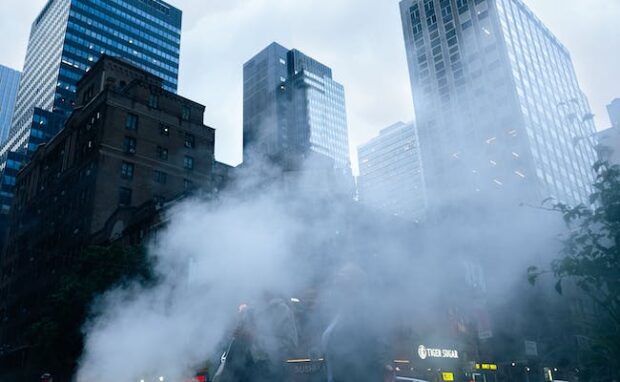Traffic emissions mess with our sense of smell
University of Eastern Finland researchers discovered traffic emissions could interfere with our sense of smell. Specifically, they discovered that traffic-related ultrafine particles shift the expression of several genes in our olfactory mucosa cells. As a result, it alters our inflammatory response and xenobiotic metabolism, which is how we absorb nutrients and medicines.
Pollution continues to be a major global concern, causing environmental and public health risks. We have been developing technologies to quell this problem, but they may take long to provide significant benefits. In response, we must understand how this issue may affect our bodies and take measures to mitigate it.
This article will discuss how traffic emissions affect our sense of smell. Later, I will explain how to keep yourself safe if you’re living in a polluted environment.
How did experts discover the unique effects of traffic emissions?

The University of Eastern Finland is the first to examine the impact of various diesel fuels and exhaust after-treatment systems on emissions in an olfactory mucosa cell model obtained from humans.
The researchers discovered that exposure to ultrafine traffic emissions changes the expression of several genes in human olfactory mucosa cells. “The olfactory system has been found to mediate the effects of environmental pollutants on the brain, thus contributing to the pathogenesis of brain diseases, said first author Laura Mussalo.
Pathogenesis refers to the development of specific illnesses. Consequently, traffic emissions could facilitate the development of brain diseases in our bodies.
“However, the exact signaling pathways through which the effects are mediated remain unknown,” Mussalo added. Moreover, the scientists checked the different impacts of fossil and renewable diesel fuels and modern after-treatment components like particle filters on emissions.
Interesting Engineering said the study identified disruptions in numerous cell-regulation systems. Significant changes appeared in gene expressions related to inflammatory response, xenobiotic metabolism, olfactory signaling, and olfactory mucosa from exposure to fossil and renewable diesel sources.
You may also like: How AI reduces traffic and pollution
However, renewable diesel had fewer negative effects compared to fossil diesel. Also, after-treatment devices minimized the cell operation changes caused by renewable diesel particles.
The study offers significant insights into the detrimental effects of ultrafine particles in an olfactory mucosa model derived from human cells. As a result, it is a foundation for future mitigation and prevention strategies for the destructive effects of pollution.
Nowadays, most countries have flaws that restrict the particulate matter and pollutants released by vehicles. Yet, road traffic emissions continue to increase despite these efforts.
How to safe in poor air quality

It seems poor air quality is a ubiquitous worldwide problem. Fortunately, there are many ways to protect yourself from its harmful effects. Try the following tips the next time you go outdoors:
- Stay indoors as much as possible: The simplest way to protect yourself from poor air quality is to stay indoors. Of course, you should avoid spreading airborne particles that could irritate your lungs. More importantly, close doors and windows to keep airborne irritants out.
- Wear a mask: Dr. Harry Kopolovich, Hackensack Meridian Health emergency medicine physician, said, “A well-fitting N95 mask can filter over 95% of fine particulate matter.” Hence, you should wear one if you’re sensitive to poor air quality.
- Use air conditioning and a purifier: Modern air conditioning units have a “re-circulate” function that prevents bringing in air from outdoors. Also, it prevents indoor temperatures from rising. According to the County of Sonoma website, excessive heat can worsen the effects of poor air quality.
- Stay hydrated and wash your clothes: Smog can irritate airways, causing you to have a dry, scratchy throat. That is why you should keep yourself hydrated constantly. However, depending on your area, you may need to wash your clothes after going outside.
- Avoid prolonged or heavy physical activity: Physical activity strains your lungs, making coping with poor air quality more difficult. That is why University of Waterloo associate professor Rebecca Saari said most people should avoid it in poor air quality.
- Monitor the air quality index daily: The Air Quality Index is a rating system that measures air quality from 0 to 500. The ALA website says an AQI below 100 is usually safe. However, that depends on whether you have a specific health condition.
- Check on loved ones who are sensitive to poor air quality: The American Lung Association recommends checking loved ones in the “sensitive group.” The latter includes children under 18, old folks, diabetics, pregnant women, and people with chronic lung and heart disease.
You may also like: Global greenhouse gas levels hit record
Conclusion
University of Eastern Finland scientists discovered the negative effects of traffic emissions on our sense of smell. They found these to alter genes related to inflammatory response and other important olfactory functions.
Future researchers could use this study as a framework to mitigate pollution’s health effects. Until then, follow the tips above to maintain your health in poor air quality.
Learn more about this traffic emission study by checking its ScienceDirect webpage. Also, check out the latest digital tips and trends at Inquirer Tech.